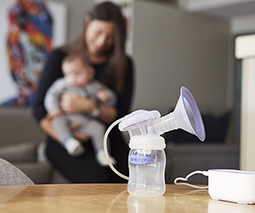I almost quit breastfeeding because my baby’s tongue-tie was repeatedly missed

The moment I laid eyes on my daughter, I was filled with a joy so powerful it took my breath away. Having had three miscarriages before my “rainbow” baby, I was overcome with love, relief and joy – absolute joy.
My desire to breastfeed her was so strong I saw my first lactation consultant when she was just 48 hours old. I knew that early support and assistance is crucial in establishing successful breastfeeding. Already I had blistered nipples and poor attachment, but I was told my technique was fine and there was nothing wrong. But issues persisted.
We persevered, but my baby never drained my boobs. She would arch her back, pull off and on, lose suction, and she was grizzly and unsettled almost all of the time. I asked my MCHN to check her for tongue-ties, as she exhibited many of the symptoms. She gave the all clear.
Breastfeeding problems
When my baby was two months old we were in a bad place. She struggled to feed for more than a minute at a time. She lost suction and pulled off in distress. I saw a second LC. Again, I was told there was nothing wrong and to go and “enjoy” my baby. But I knew something was wrong and my baby was impossible to enjoy when she was so upset. Feeds ended with both of us in tears.
As with everything in parenting, advice was abundant and conflicting. Did my baby have reflux, a dairy intolerance, tongue-tie, or was there something wrong with my supply or flow? I saw a paediatrician. After a cursory assessment (which did not involve an oral examination) and a few brief questions (none of which related to breastfeeding or oral function) my paediatrician told me she most likely had silent reflux and sent me away with a script for Zantac.
While it’s true my baby presented symptoms of reflux, I couldn’t shake the feeling that there was more to it. My gut told me it was related to my baby’s oral function.
Seeking answers
I saw a third IBLC when she was four months old. She observed a feed and suspected a low supply. I didn’t think supply was the issue, but experts know best, right? So I went to my GP, got some Motilium, expressed around the clock and ate lactation cookies like the Cookie Monster in a bid to boost my supply. But the problems continued. Well-meaning friends and family suggested I switch to formula, but I desperately wanted to breastfeed. The niggling suspicion that she had a tongue-tie persisted, despite being told by numerous health professionals that she did not have one.
I sought the opinion of a fourth IBLC – my last hope. By now we were one feed away from giving up. She gave my baby a thorough assessment and concluded she had an upper lip-tie and a posterior tongue-tie. No wonder my poor baby couldn’t feed effectively. I wept when I left – tears of relief for the answers I finally had, and of frustration it had taken so long to get them.
What is tongue-tie?
A tongue-tie occurs when the thin piece of skin under the baby’s tongue (the lingual frenulum) restricts the movement of the tongue. Some babies who have tongue-tie don’t seem to be bothered by it. In others, it can restrict the tongue’s movement, making it hard to attach properly to the breast. Tongue-tie is sometimes diagnosed during the routine newborn check, but not always. Posterior tongue-ties are harder to diagnose.
How it affects breastfeeding:
To breastfeed successfully, the baby needs to latch on to both the breast tissue and nipple, and their tongue needs to cover the lower gum so the nipple is protected from damage.
Babies with tongue-tie aren’t able to open their mouths wide enough to latch properly. There are many symptoms of tongue-tie, so I will highlight a few of the common ones.
They may:
- Have difficulty attaching to the breast or staying attached for a full feed,
- Be tense and unable to relax when feeding – displaying clenched fists, tension in head/neck, etc.
- Be unsettled and seem to be hungry all the time,
- Not gain weight as quickly as they should,
- Make a “clicking” sound as they feed with poor milk transfer,
- Lose suction and come off many times during the feed.
Treatment for tongue-tie
If tongue-tie is interfering with breastfeeding, then release of the tight frenulum can help. Snipping a tight frenulum in young babies is a simple procedure that takes only a second or two. But if it is missed (as in my case) then your baby may need a surgical procedure called a frenectomy. The technique differs according to the age of the person.
Our baby had a frenectomy performed by laser. With the help of a wonderful paediatric chiropractor, and the IBLC who helped diagnose the tongue-tie, we are in a much happier place. Feeding is improving and although it is not perfect, she is now having five feeds a day at the breast and only one bottle.
My beautiful rainbow baby is well and thriving.
Michaela Fox is a freelance writer, blogger and mother of three. She muses on the ups and downs of motherhood on her blog Not Another Slippery Dip, and believes in ‘good-enough’ parenting. You can also follow her on Facebook, Twitter or Instagram.









